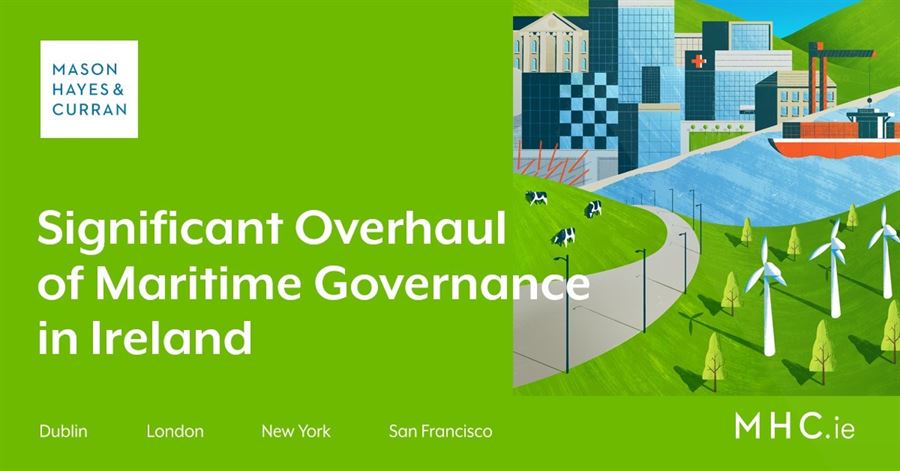Significant Overhaul of Maritime Governance in Ireland

The Government published the National Marine Planning Framework (the NMPF) on 30 June 2021, in tandem with the Maritime Area Planning Bill (the MAP Bill).
The NMPF is the overarching framework for decisions and will now be a key consideration for decision makers on marine authorisations. The MAP Bill is the new legislative framework for development consent and management of Ireland's offshore marine area. All applications for activity or development in Ireland’s maritime area, including those made within the new development management system under the MAP Bill, will be considered in terms of their compliance with the objectives of the NMPF.
The National Marine Planning Framework
While national or regional marine planning has been in place in other countries, such as Australia and Canada, for several years, it is a relatively new concept within the EU. The NMPF was obligated under the EU Maritime Spatial Planning Directive (the Maritime Directive). The Maritime Directive, introduced in 2014, requires Member States to consider economic, social and environmental aspects to support sustainable development and growth in the maritime sector. This has been achieved in the NMPF by focusing policy interventions in 16 key areas:
-
Aquaculture: Support the growing aquaculture sector. Produce a modern licensing and enforcement system to produce high quality food, which also protects and enhances the social and economic fabric of coastal and island communities in a sustainable manner.
-
Defence and Security: Any proposal that has the potential to interfere with the performance by the Defence Forces must be subject to consultation with the Defence Organisation. The Defence Organisation’s objective is to provide for the military defence of the State, contribute to national and international peace and security and to fulfil all other roles assigned by Government.
-
Energy – Emerging Technologies (Carbon Capture and Storage, and Hydrogen): To further examine the feasibility of the safe and cost-effective utilisation of Carbon Capture and Storage (CCS). If considered feasible, to develop CCS as a safe, viable technology to support decarbonisation.
-
Energy – National Gas Storage: Support the development of natural gas storage. Particularly, in the context of the outcome of the review of the security of energy supply of Ireland’s electricity and natural gas systems.
-
Energy Offshore Renewables: Support the development of offshore renewables in Ireland to significantly reduce greenhouse gas emissions and accelerate the move to cleaner energy. Support the strategic growth of the industry and provide an enhanced security of energy supply for Ireland.
-
Energy – Petroleum: Ensure good regulatory practices in managing existing authorisations for exploration and production, including decommissioning of existing production facilities when resources are exhausted, in accordance with international best practice
-
Energy – Transmission: Develop the offshore electricity transmission system and connection between the offshore and onshore electricity grids. Strengthen the existing policy framework and protect the two existing natural gas interconnector pipelines.
-
Fisheries: Deliver a sustainable seafood sector and promote a sustainable, profitable and self-reliant industry
-
Mineral Mining and Exploration: Maximise the contribution of environmentally sustainable exploration and mining sector. Only proposals which are in line with national policy on mineral exploration and mining should be considered, provided they fully meet the environmental safeguards.
-
Ports, Harbour and Shipping: Safeguard the operation of ports as key actors in the economic wellbeing of the State. Facilitate a competitive and effective market for maritime transport services.
-
Safety at Sea: Ensure that safety at sea and navigational safety are key considerations in the assessment of proposals for the development of the marine area
-
Seaweed Harvesting: Support the sustainable harvesting of seaweed. Develop and maintain a fit for purpose regulatory framework that supports sustainable harvesting.
-
Sports and Recreation: Increased participation in a range of water-based sports and recreation activities for the benefit of public health and wellbeing, as well as developing tourism
-
Telecommunications: Facilitate international high-speed connectivity between Ireland and other countries
-
Tourism: Position Ireland as a world-class sustainable coastal and marine tourism destination
-
Wastewater Treatment and Disposal: Bring and maintain public water and wastewater services to acceptable international benchmarks
-
Implementation and Monitoring: The objectives of the NMPF must be supported and implemented by all public bodies that have a role in making policies, plans or programmes relevant to the maritime area. The Minister for Housing, Local Government and Heritage will also have the power to direct a public body to adopt measures to implement or ensure compliance with the NMPF.
Maritime Area Planning Bill
The MAP Bill represents a significant overhaul of the previous planning development regime for the maritime area in Ireland. Applications under the MAP will now be assessed against the policy objectives set out in the NMPF. Some of the most significant provisions include:
-
Marine Area Consent (MAC): The consent regime is being replaced and streamlined by a single State consent system for the maritime area. This will enable occupation of a certain marine area with a binding condition to apply for planning permission to the planning authority. This eliminates the unnecessary duplication of development management processes, including environmental assessments, for activities or developments that are currently assessed under both the foreshore and planning regimes.
-
Maritime Area Regulatory Authority (MARA): Establishes the MARA to undertake certain functions, such as assessing and granting MACs; licensing certain activities and enforcement and compliance in respect of planning decisions.
-
Transitional Arrangements: The MAP Bill sets out transitional provisions for existing foreshore authorisations granted under the previous regime. Holders of authorisations granted under the previous foreshore regime to occupy a part of the foreshore may, at any time before the expiration of the foreshore authorisation, make a MAC application to surrender the authorisation to the MARA for a MAC. A MAC must be held before planning permission can be applied for. There is also a transitional regime for pre-existing licences as well as provisions to regularise unauthorised maritime usages within a certain timeframe.
-
Special MAC cases: The MAP Bill also provides for Special MAC cases which appear to facilitate a fast-track system for designated “Relevant Projects”. Under these provisions, the Minister for the Environment, Climate and Communications (the Minister) may invite MAC applications from those who are the subject of an application for a foreshore authorisation previously made or foreshore authorisations, grid connection agreements or grid offers previously granted from applicants who fulfil certain criteria. Such Special MAC cases are to be assessed by the Minister as opposed to MARA. The Minister is required to give public notice that he intends to invite MAC applications or has received MAC applications and publish the notice on a website of the Government. The functions of the Minister under the Special MAC provisions appear only to be in force for a certain period of time or the defined “relevant period”[1]under the MAP Bill. However, the functions of the Minister after the expiration of the “relevant period” may be carried on or completed by MARA. Every MAC granted by the Minister during the “relevant period” will be in force as if it had been granted by MARA and will be subject to any amendments, revocations or suspensions in accordance with the provisions of the MAP Bill.
Conclusion
The introduction of both the NMPF and the MAP Bill reflect the Government’s commitment to modernise the State's approach to marine management. Taoiseach Micheál Martin released a statement that the MAP Bill represented “the biggest reform of marine governance in a century”.
Climate action and carbon reduction appear to be central themes in both publications. It is clear that the Government intend to bolster support for offshore renewables and sustainable practices will be enforced for any future project and existing gas storage and existing petroleum exploration.
The NMPF will be a core document on which MAC and development consents will be assessed. Developers and planners will have to ensure that the overarching policy objectives and the overall goal of sustainable marine management are considered in order to develop infrastructure in Ireland’s maritime area.
[1] Under Section 97 of the MAP Bill, “relevant period” means the period commencing on the coming into operation of Parts 4 and 6 (including any Schedules referred to in those Parts) for the purposes of this section and ending on the establishment day.; and Under Section 39 of the MAP Bill “establishment day” means The Minister shall, by order, appoint a day to be the establishment day for the purposes of this Act.
For more information contact a member of our Planning & Environmental team.
The content of this article is provided for information purposes only and does not constitute legal or other advice.
Share this:




